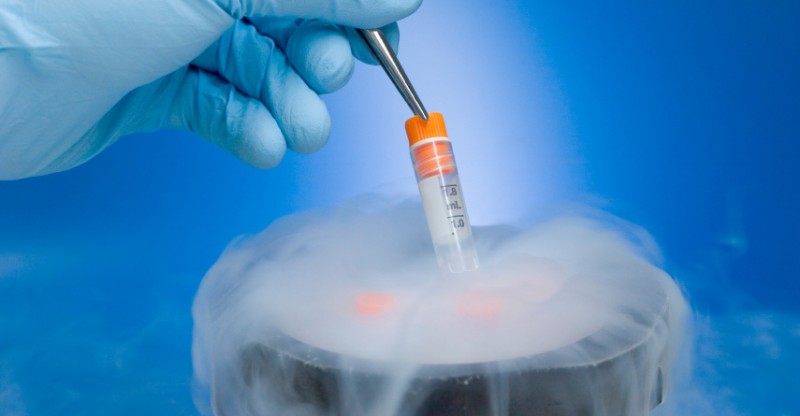What is Sperm Cryopreservation
Men’s sperm degrades with age just like women’s eggs do.
Cancer treatment and different illnesses can affect a man’s sperm so it makes sense for men to do what women have been told to do.
Freeze some sperm while you’re young so you have some good sperm to use later.
Why Sperm Cryopreservation?
You may never go out of style but your genes just might, that’s why you might want to freeze some of your little swimmers now as insurance for your reproductive future.
The majority of men who invest in sperm cryopreservation at a sperm bank do it for one of the following reasons:
- undergoing the vasectomy,
- undergoing chemotherapy, radiation therapy or surgery that can compromise their fertility,
- having diabetes,
- having an autoimmune disorder,
- engaging in a high-risk occupation which involves exposure to radiation, dangerous chemicals, or physical harm, or
- advancing age.
Now the first five reasons on the list are probably not a surprise to anybody but the last one, advancing age, might be.
The fact that women’s egg quality starts to decline by age 30, and by age 40 the viable eggs she has are not good quality, is not breaking news.
This is partially because women are born with all the eggs they will ever have and those eggs age right along with her body, no new ones are ever made.
Men, on the other hand, make new sperm continually from the time they hit puberty, so they are fertile for the rest of their lives unless something interferes.
Because men are constantly making new sperm, most people don’t realize that the quality of men’s sperm degrades as they get older.
While men are making new sperm constantly, as they get older the percentage of viable sperm they make decreases.
When you freeze sperm at a relatively young age you are, in effect, taking out fertility insurance.
You have insurance on a lot of things that can be replaced, like your car and house, even your phone, so doesn’t it make sense to do something to insure your future fertility as well?
All men produce some defective sperm, with men producing an average of 19 million sperm per day, this shouldn’t be a surprise.
Now in younger men, there is less defective sperm produced and the few that are produced are usually taken care of by the immune system.
The race is still on though, there are plenty left to swim head on into the egg in hopes of being the one who breaks through the outer layer and fertilizes it.
However, researchers have found that older men’s immune systems do not get rid of defective sperm as effectively as younger men’s systems do.
They have also found that there is a link between increasing age and the number of defective sperm a man has.
When discussing “older men” here the researchers aren’t talking about the social security set, this starts to happen around age 35.
Yes, age 35 and this is a normal man without any medical condition that can cause fertility issues or an occupation that can damage fertility, e.g., someone working at a nuclear plant.
This is because men’s testosterone levels decline gradually by about 1% to 1.5% each year after age 35.
With lowered testosterone comes lowered sperm count.
In one Kentucky study, of men undergoing fertility treatment with their partners, it was discovered that their average sperm count dropped from about 107 million for men in their 20s to about 35.5 million for those in their 50s.
It also means more deformed sperm that can’t fertilize an egg.
In an article in Human Reproduction, it was noted that older men had more abnormal sperm morphology with decreasing numbers of normal forms (14% versus 25%) and reduced vitality (51% versus 80%), as well as sperm tail abnormalities (30% versus 17%).
In other words, fewer of the sperm produced were able to fertilize an egg.
One other problem noted in children born to older fathers is an increase in autism and schizophrenia.
These genetic mutations are passed to the child from the father in almost all cases.
Unlike sperm, the mother’s eggs are all produced at the same time so they don’t develop genetic mutations as the mother ages.
The genetic composition of the egg she releases at 15 is the same as the egg she releases at 40.
So, as men age, they have more defective sperm and their immune systems are less effective in getting rid of them.
It sounds like men need to rethink fertility a little, they can’t count on their little guys to be swimming strongly indefinitely.
A lot of people are delaying parenthood, so this is going to become more and more of an issue as time goes on.
So, what can men do to retain their sperm’s fertility until they’re ready to use it?
The answer is basically the same answer women get, freeze the reproductive materials when you’re young so you don’t have to worry about fertility loss when you’re ready to have a child.
Women are advised to freeze their eggs before age 35, preferably before age 30, so when they’re ready to become mothers they have viable eggs to work with.
For the majority of women, especially women over age 35, the uterus isn’t the problem when infertility strikes.
The problem is quite often the quality of the egg so that’s what they’re trying to preserve.
With men, it’s sperm.
Now the sperm of a healthy man, in a safe profession, doesn’t degrade as quickly as a woman’s eggs.
But, if he’s over 40 and still hasn’t fathered any children but wants to have the option available, it’s probably time to look into Sperm Cryopreservation.
So, you’ve finally had your “I forgot to have children” moment and realize you might still want some.
This has led you to the conclusion that it’s time to freeze some sperm, what’s the next step?
How Sperm Cryopreservation Works
If you’re working with a fertility center, and they don’t have an in-house sperm bank, they will probably have a working relationship with one.
This is where you start because they will know exactly how to preserve and store the sperm so the fertility center can use it immediately after thawing.
If you aren’t working with a fertility center, if you are storing sperm as an insurance policy or because of a medical issue, calling your local fertility center for their recommendation is still a good idea since they deal with sperm banks daily.
If a man is healthy and freezing sperm as an insurance policy for future use, the sample will be gathered through masturbation.
The sample needs to be at the fertility center within an hour of the collection so sperm banks have rooms available for men to use for this purpose.
One thing you’ll want to look for is a sperm bank that uses the most up-to-date technology.
The latest freezing technique for both sperm and eggs is called vitrification, it’s a flash-freezing method that provides superior post-thaw motility and cryosurvival.
For sperm collected through ejaculation, this process, using liquid nitrogen, is the preferred method of freezing for storage.
With this process, there is generally no degradation of samples during storage or thawing and the chances of water inside the cell forming into ice are very small.
That’s because the sample is basically freeze-dried so no water to cause problems.
If the sample is taken for insurance purposes only, and may not be used for assisted reproduction, then the whole sample can be preserved without processing first.
Each sample produced usually produces between two and four vials of sperm for storage.
The decision on how many vials each sample produced is based on the number of motile sperm available.
There are usually between 7 and 13 million motile sperm per vial.
Most fertility experts suggest a man store at least 12 vials of sperm whether for use with fertility procedures or as an insurance policy.
Generally, one vial of sperm is used for each fertility procedure.
The average percentage of women who get pregnant on their first IVF try is 30% so a supply of 12 vials of sperm would seem to be the minimum.
The good news is that frozen sperm can be used for all types of fertility treatment, including IUI, IVF, and ICSI.
IUI is a less invasive procedure but also not as successful.
The average pregnancy rate for IUI, using fertility drugs, is between 7 and 16%.
Like IVF, each IUI cycle uses one vial of sperm but with the lower success rate it if you don’t have a large number of vials stored, IUI might be wasting your valuable resource.
When sperm is used for any kind of fertility procedures it has to be spun and washed before use.
This gets rid of the seminal fluid and slow swimming sperm so you are only using active sperm in the IUI, IVF and ICSI procedures.
This can be done before freezing or after thawing, but if it’s definitely going to be used for a fertility procedure you might as well do it before freezing.
When preserving sperm, whether for ongoing fertility procedures or as an insurance policy, you may need to be tested for communicable diseases.
Sperm preservation agencies require testing because they worry about cross-contamination.
If you do test positive for any of these diseases your sperm can still be stored but not at the agency where there’s a chance of cross-contamination, it can be stored elsewhere.
Some states don’t require testing if the sperm being preserved is for personal use but other states do require it.
For example, current California State Department of Health guidelines require that men preserving sperm (including preserving for a partner) be screened for certain infectious diseases.
Screening is also required if the sperm is for storage only, not being used soon.
The screening includes the following blood tests:
- HIV I-II
- Hepatitis C virus
- Hepatitis B surface antigen
- HTLV
- Syphilis
This blood test is included in the initial Specimen Cryopreservation Services packages from most sperm banks.
The initial package, without any extra genetic testing or sperm sorting by sex, generally includes freezing one sample.
An average sperm donation cost is $800 for the first sample and additional samples average $270.
After the samples are frozen there is a yearly charge of around $375.
Some sperm banks offer discounts to military families and cancer patients on the storage fees so if you fall into one of those categories it’s worth asking about.
Male fertility, it isn’t always as effortless as people have always been led to believe.
Sperm starts to degrade just like eggs do but most men just aren’t as aware of it.
There are a number of reasons a man would need to bank sperm, including:
- having a medical problem or procedure that could cause sterility;
- working in a high-risk profession and wanting to protect his ability to father children; or
- wanting some assurance that he will be able to father children when he’s ready.
So, if you’re a man who wants his genes to be around to entertain generations to come, it’s probably time to start looking into sperm cryopreservation.
FDA Compliance
The information on this website has not been evaluated by the Food & Drug Administration or any other medical body. We do not aim to diagnose, treat, cure or prevent any illness or disease. Information is shared for educational purposes only. You must consult your doctor before acting on any content on this website, especially if you are pregnant, nursing, taking medication, or have a medical condition.
HOW WOULD YOU RATE THIS ARTICLE?





